Top Scratch-Resistant Materials for Your Kitchen Sink: Which One Reigns Supreme?
When it comes to choosing the perfect kitchen sink, one of the key factors to consider is the material’s resistance to scratches. A scratch-resistant sink not only maintains its aesthetic appeal but also ensures durability and ease of maintenance. Here, we delve into the top materials for your kitchen sink, comparing their strengths, weaknesses, and practical considerations.
Understanding the Importance of Scratch Resistance
Before we dive into the materials, it’s crucial to understand why scratch resistance is so important. A kitchen sink is one of the most used fixtures in your home, exposed to sharp utensils, hot pots, and frequent cleaning. Scratches can not only mar the appearance of your sink but also create crevices where bacteria and dirt can accumulate, compromising hygiene.
Also read : Essential Features Your Digital Meat Thermometer Must Have for Perfectly Smoked Meat
Stainless Steel Sinks: The Classic Choice
Stainless steel sinks are a popular choice for many homeowners due to their durability, ease of maintenance, and affordability.
Pros of Stainless Steel Sinks
- Durability and Heat Resistance: Stainless steel sinks are highly resilient to heat, rust, and stains. They can withstand daily abrasions and are ideal for busy kitchens[2][3].
- Easy Maintenance: The smooth, non-porous surface of stainless steel makes it easy to clean and maintain. It inhibits the growth of bacteria and can be kept looking brand new with a simple wash with soap and water[2][3].
- Adaptable Design Choices: Stainless steel sinks come in a range of sizes and designs, making them versatile for any kitchen style[2].
Cons of Stainless Steel Sinks
- Prone to Scratches: Despite their many benefits, stainless steel sinks are prone to scratches. Items dropped into the sink, like cutlery, can scratch the surface, and over time, these scratches can accumulate[3].
- Noise: Stainless steel sinks can be noisy, especially when dishes or running water hit the metal surface[3].
Granite Composite Sinks: A Luxurious Alternative
Granite composite sinks offer a luxurious look and feel, along with several practical advantages.
This might interest you : Top Automatic Pan Stirrer Picks for Perfect Risotto Every Time
Pros of Granite Composite Sinks
- Visual Appeal: Granite composite sinks come in a range of colors and finishes, adding a luxurious touch to your kitchen. They resemble natural stone and can blend seamlessly with your countertops[2][3].
- Stain and Scratch Resistance: These sinks are more resistant to stains and scratches compared to stainless steel. They also absorb sound, making your kitchen a quieter place[2][3].
- Hygienic: The non-porous material of granite composite sinks is hygienic and easy to clean, resisting water spots and hiding stains[3].
Cons of Granite Composite Sinks
- Cost: Granite composite sinks are generally more expensive than stainless steel sinks. They also require more maintenance to prevent staining over time[2][3].
- Installation: These sinks can be more challenging to install, and their weight may require additional support[2].
Quartz Sinks: The Modern Option
Quartz sinks, often made from a blend of quartz and resin, offer a modern and durable solution.
Pros of Quartz Sinks
- Durability: Quartz sinks are highly durable and resistant to scratches, stains, and heat. They are non-porous, ensuring easy maintenance and hygiene[3][5].
- Aesthetic Flexibility: Quartz sinks come in a variety of colors and patterns, allowing for maximum customization to fit any kitchen design[3].
- Low Maintenance: Quartz is easy to clean and maintain, requiring only basic care to keep its appearance intact[3].
Cons of Quartz Sinks
- Cost: While quartz sinks are less expensive than granite, they are still more costly than stainless steel options[3].
- Potential for Chipping: Quartz can chip or crack if hit too hard, although this is less common than with other materials[5].
Fireclay and Porcelain Sinks: The Classic Elegance
Fireclay and porcelain sinks are known for their traditional and elegant appearance.
Pros of Fireclay and Porcelain Sinks
- Durability: Fireclay and porcelain sinks are durable and resistant to heavy impacts. They are made from clay fired at high temperatures, making them nearly impervious to scratches, stains, and chips[3][4].
- Aesthetic Appeal: These sinks provide a classic and elegant look, fitting well into farmhouse or traditional kitchen designs[3][4].
- Hygiene: The smooth surface of fireclay and porcelain sinks is easy to clean and maintain, inhibiting the growth of bacteria[4].
Cons of Fireclay and Porcelain Sinks
- Weight and Installation: Fireclay and porcelain sinks are heavier and often more expensive than stainless steel versions. They can also be more challenging to install[3][4].
- Potential for Staining: While durable, these sinks can stain if not properly maintained, especially from harsh chemicals or water stains[4].
Natural Stone Sinks: The Luxury of Nature
Natural stone sinks, such as those made from granite or marble, offer a unique and luxurious option.
Pros of Natural Stone Sinks
- Aesthetic Appeal: Natural stone sinks provide a unique and luxurious look, adding a touch of elegance to your kitchen[5].
- Durability: Natural stone is highly durable and resistant to heat. Granite, for example, is very strong and can withstand hot pots and pans being placed on it[5].
- Hygiene: Natural stone surfaces are generally easy to clean and maintain, although they may require sealing to prevent staining[5].
Cons of Natural Stone Sinks
- Cost: Natural stone sinks are among the most expensive options. Granite, in particular, can be costly and difficult to install[5].
- Maintenance: Natural stone requires regular sealing to prevent staining, and it can be porous, making it more prone to stains if not properly maintained[5].
Comparative Analysis: Which Material Reigns Supreme?
Here’s a detailed comparison of the key materials:
| Material | Durability | Scratch Resistance | Heat Resistance | Maintenance | Cost | Aesthetic Appeal |
|---|---|---|---|---|---|---|
| Stainless Steel | High | Low | High | Easy | Low | Modern |
| Granite Composite | High | High | High | Moderate | High | Luxurious |
| Quartz | High | High | High | Easy | Moderate | Modern |
| Fireclay/Porcelain | High | High | High | Moderate | High | Classic |
| Natural Stone | High | High | High | Moderate | Very High | Luxurious |
Practical Insights and Actionable Advice
When choosing the best material for your kitchen sink, here are some practical considerations:
Budget
- If you are on a limited budget, stainless steel sinks are often the most cost-effective option[2][3].
Usage and Lifestyle
- If you frequently host parties or have a large family, stainless steel or granite composite sinks might be the best choice due to their durability and ease of cleaning[2][3].
Installation and Compatibility
- Consider the installation process and compatibility with your countertops. For example, natural stone sinks may require additional support due to their weight[5].
Maintenance
- Think about the maintenance needs of the material. Quartz and stainless steel are generally low maintenance, while natural stone and fireclay/porcelain require more upkeep[3][5].
Quotes from Experts
- “Stainless steel is both versatile and practical, making it the most popular choice. However, it can scratch over time, and items dropped into the sink may clang loudly against the metal.” – Alice Moszczynski, Interior Designer at Planner 5D[3].
- “Quartz, composites, and other stones can look great and blend in seamlessly with the countertops but will require more maintenance since these materials are easier to stain over time.” – Octavio Estrada, Design Experience Manager at Block Renovation[3].
Choosing the right material for your kitchen sink is a decision that balances aesthetics, durability, and practicality. Here are some key takeaways:
- Stainless Steel: Ideal for those on a budget and needing a durable, easy-to-clean sink.
- Granite Composite: Perfect for those who value aesthetics and noise reduction.
- Quartz: A modern option that offers durability and low maintenance.
- Fireclay/Porcelain: Suitable for those seeking a classic, elegant look.
- Natural Stone: The ultimate luxury option for those willing to invest in durability and unique aesthetics.
By considering your specific needs and preferences, you can select the best scratch-resistant material for your kitchen sink, ensuring it remains a central and functional part of your kitchen for years to come.
Detailed Bullet Point List: Factors to Consider When Choosing Your Kitchen Sink
-
Budget:
-
Stainless steel sinks are generally less expensive.
-
Granite composite and natural stone sinks are more costly.
-
Quartz sinks fall in the middle in terms of cost.
-
Usage and Lifestyle:
-
If you host frequently or have a large family, consider durable materials like stainless steel or granite composite.
-
For a quieter kitchen, granite composite sinks are a good option.
-
Installation and Compatibility:
-
Ensure the sink material is compatible with your countertops.
-
Natural stone sinks may require additional support due to their weight.
-
Maintenance:
-
Stainless steel and quartz are low maintenance.
-
Natural stone and fireclay/porcelain require more upkeep, including sealing and avoiding harsh chemicals.
-
Aesthetic Appeal:
-
Consider the design style of your kitchen and how the sink will fit in.
-
Granite composite and natural stone offer a luxurious look, while stainless steel and quartz provide a modern aesthetic.
-
Durability:
-
All the mentioned materials are durable, but natural stone and fireclay/porcelain are particularly resistant to heavy impacts.
By carefully evaluating these factors, you can make an informed decision that suits your needs and enhances the functionality and beauty of your kitchen.











